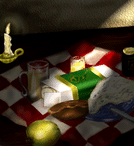


ve got some Stilton, Branston pickle, the rest of a beef pasty, an apple, a box of biscuits, a little cider for me and some orange juice for you. And what would a picnic in the attic be without candlelight?"
"Delightful! What wonderful taste you have for a Yank," she said, feigning a fairly convincing English accent (she'd heard the term "Yank" on the street a few days before and was determined to build it into her vocabulary despite her status as one). He was constantly surprised these days by her increasing sophistication. Sometimes he missed the days of her deep innocence, but he also found her growing ability to converse a delight. They held forth on a broad range of topics and she, somewhat surprisingly, held her own. A few years before, a good friend had told him that when children started saying, "yeah, right," it signaled the end of childhood and the beginning of adolescence. As expected, it had only been a few weeks later that the dreaded signal escaped her lips.
"Where'd you hear that?" he had asked.
"I dunno. School, I guess."
"You know what that means, don't you?"
"What?"
"Its means you're no longer a baby."
"Yeah, right, Dad."
His friend had pointed out that "yeah, right" signaled the birth of ironic self-awareness and a growing social distrust. "Yeah, right." He'd thought at the time, only to be proven wrong a few weeks later. It still brought a pang.
"Dad?"
"What?!" His reverie evaporated.
"Can I have a sip of cider?"
"Oh, sure. Do you want some Stilton?"
"Yuck. Smells like dirty feet. No, thank you."
He remembered the "smell the world" phase she went through when she was four, when the odors of food and people were a never ending source of fascination, experimentation and delight. Socialization indeed. She certainly wasn't like that these days.
"Dad. Where's Bosnia?"
He had been waiting for this. Leslie used to take only a passing interest in knowing where her mother's assignments took her. That, seemingly, had changed.
Jeanette was a special correspondent for an American news service. He job had taken her into many hostile situations and he had learned long ago how to deal with it. Nothing that had come before prepared them for what was happening in Bosnia. The harsh winter conditions made communications unreliable and difficult. Among the peace-keeping force and press, injuries were rampant. The day before he and Leslie left for England, a troop carrier slid off a steep mountain road, killing 12 soldiers and two journalists. He'd spent a fretful day trying to confirm Jeanette's safety. In the end, he'd had to take her editor's word and get on the plane. He wasn't able to speak directly to his wife for another three days.
"Um... Bosnia is in Eastern Europe."
"Is it far from here?"
"Well, kind of, yes. It's a lot closer to London than it is to Seattle. That's why we came here."
"So we could go visit Mommy?" Her choice of words was telling: Mommy rather than Mom or Mother.
"No, sweetie, there's a war going on there."
"People are fighting?"
"Yes. People are fighting."
"Why?"
"I don't really know."
"Is Mommy fighting?"
 The sophistication he marveled over moments before was nowhere in sight. Now he was confronted with
a little girl who simply didn't understand what was happening to her family.
The sophistication he marveled over moments before was nowhere in sight. Now he was confronted with
a little girl who simply didn't understand what was happening to her family.
"No, sweetie, your mother—you know what your mother does, she writes stories for people to read in the newspaper"
"Oh, yeah."
"--Your mother is in Bosnia to write about it so that people will know what's happening there."
"Oh, yeah."
"Well, I think it's time to see what's in that trunk." The low ceiling kept him from standing upright, so he slid across the floor to the trunk.
"Not exactly a pirate trunk, but you're right-it's pretty old. I doubt it belongs to your Aunt Shirley."
The trunk was smaller than he had first thought, covered in brown leather and bronze straps which had become crusted with verdigris. It looked sturdy, weatherproof and efficient. Elizabeth pushed at the lid, but it failed to move.
"Here, I have just the right thing." He said, reaching into his pocket for the Swiss army knife he carried with him constantly. I'll bet I can push the pins out of the hinges in the back. He moved behind the trunk and, using the heavy rounded "awl" bladeon the knife, hammered at the pins until they each dropped to the floor.
"Viola! Now you know why I always carry this knife. Your mother's always making fun of me..." He trailed off into silence as they both pursued the next thought: will she come back?
"You be sure and tell her how handy this little knife was, okay? Maybe she'll stop teasing me about it," he said with forced gaiety.
As he slid the heavy wooden lid onto the floor, Elizabeth peered inside.
"Oh, look dad! What a cool book!" she said lifting a beautiful green volume up into the light.
©1995 Hyperbole Studios Inc.